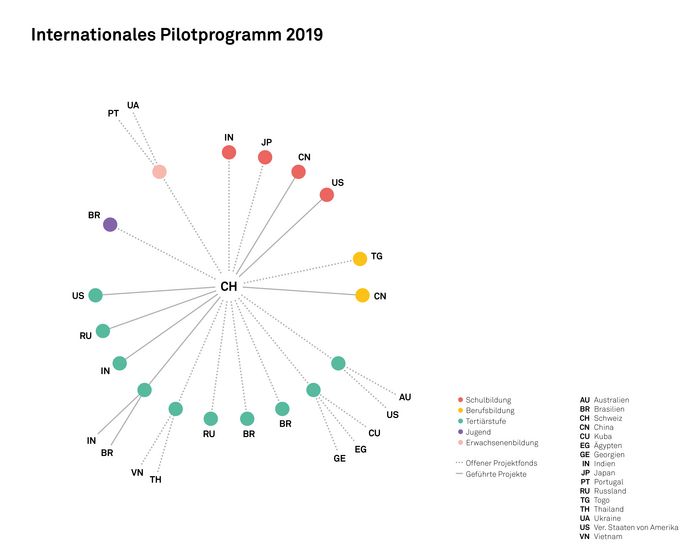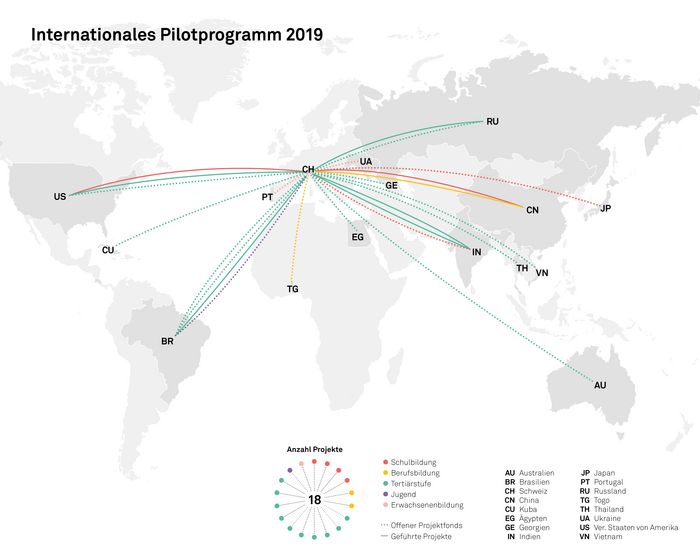Success of Movetia's international pilot programme – call for projects 2020 is open
68 projects submitted in 2019, in cooperation with about 41 countries around the world
Some 68 projects stemming from different degrees or training sectors have been submitted to Movetia in 2019. This confirms the interest shown in this new programme launched in 2018 from the very outset, despite the limited financial resources available (approx. CHF 750,000 per year), which are insufficient to allow the potential of all the projects to be fully exploited. Of the 18 projects adopted, ten relate to the university sector, two involve vocational training institutions, four concern the field of general education, one involves adult learning organisations and one relates to the youth sector, with projects to be implemented in the four corners of the globe (see map).
Internationalisation promoting scientific and educational innovation
Encouraging mobility and cooperation for training purposes within Europe and beyond is a core element of the Confederation’s education policy. The remit entrusted to Movetia by the State Secretariat for Education, Research and Innovation (SERI) is to expand the geographic scope beyond the borders of Europe and to test new mobility ideas or cooperation models through the implementation of this pilot programme. The projects must generate added value for the institutions themselves as well as for the Swiss education system. This is primarily assessed through the innovative nature of the projects, the associated multiplier effects and their sustainability.
Physical and virtual mobility, green mobility, innovation transfer and intercultural approaches – the scope for collaboration is vast
The selected projects focus on key aspects of the current socio-economic and educational landscape. There is a tangible need to explore other forms of mobility and cooperation, and even to invent new forms of more environmentally-friendly exchange. The aim of the “Tackling Climate Change through Global Learning” project submitted by Zurich University of Applied Sciences, for example, is to develop innovative strategies to address the global issue of climate change through international cooperation with Brazil and India. The planned cooperation and summer school will be organised in a virtual format only. Digitisation and digital tools also play a key role in a project involving young apprentice chefs at the GIB Glarus and the Chongqing Business Vocational College in China. Other projects focus on the next generation of scientists, such as in the project involving Renens Secondary School and the University of Alaska Southeast, which offers geography students at the school the opportunity to examine the effects of climate change. The cooperation between the University of Zurich and Harvard University, on the other hand, aims to create new opportunities for academic development in the fields of education and research, focusing on themes such as relations between democratic states and their universities or questions of the independent status of training institutions.
Cooperation and mobility – a first step on the road to sustainable partnership or research projects
With the involvement of students, apprentices and teaching staff, these projects are often the first milestone or the starting point of more specific collaborations between institutions, with the ultimate aim of becoming regular exchanges of best teaching or scientific practices, long-term partnerships and collaborations focusing on a specific issue or even tertiary-level research projects. Facilitating these pioneering exchanges is of the utmost importance. This is why international mobility plays a pivotal role in strategic innovation partnerships and why the internationalisation of education is so important both to Switzerland and its education system.
Call for projects 2020 now open
All Swiss schools or institutions wishing to implement innovative cooperation projects are invited to submit their ideas to Movetia. The subsidy application procedure comprises two phases. During the first phase starting today, candidates have until 31 January to present an initial draft outlining their project. They will then be notified of whether or not their project has been accepted. In the event of a favourable decision, they can then present a more detailed request during the second phase before the final deadline of 31 May.
Download
-
.pdf80 KB
-
.pdf402 KB
-
.jpg2 MB
-
.jpg2 MB

